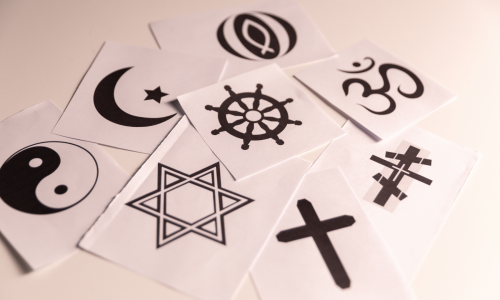“But what things were gain to me, these I have counted loss for Christ. Yet indeed I also count all things loss for the excellence of the knowledge of Christ Jesus my Lord, for whom I have suffered the loss of all things, and count them as rubbish, that I may gain Christ.” -The Apostle Paul (Philippians 3:7–8)
There is a sobering reality woven throughout Scripture: false religion can take us further than we ever imagined, deeper into darkness than we ever intended to go. But what is a “false religion” anyway? Well, for a Bible-believing born again Christian, it is any set of values we live by (not just another organized religion), which deviates from God’s Word. My friend, even as a born again believer, if you’ve read or listened to my story, you know that I lived in the hypocrisy of my own way. I lived by the rules I’d decided to follow without having a relationship with Christ.
My false religion had made my “Christian” life a train wreck.
In the Basic Bible Truths, we have a whole chapter on Human Religions. It is any man-made system which denies the basic tenets of the Gospel, or it can be a set of rules a born again believer decides is better than what God’s Word prescribes (this was me), or a religion laden with tradition that looks outwardly holy but inwardly rejects the authority of Christ. Anything that elevates human effort above God’s grace becomes a dangerous counterfeit. And no one illustrates this more clearly than Saul of Tarsus—the man we now know as the Apostle Paul.
Saul was a rising star in Judaism. Born in Tarsus, trained under the famous teacher Gamaliel, he excelled in his knowledge of the Law and the traditions of his fathers. He described himself as “circumcised the eighth day, of the stock of Israel, of the tribe of Benjamin, a Hebrew of the Hebrews; concerning the law, a Pharisee; concerning zeal, persecuting the church; concerning the righteousness which is in the law, blameless.” (Philippians 3:5–6)
By human religious standards, Saul was flawless, but by God’s standard, he was blind.
When the gospel of Jesus Christ began to spread, Saul saw it as a threat to everything he had built his identity upon. Instead of pausing to ask whether Jesus was truly the Messiah promised in the Scriptures, he claimed to defend, Saul’s false religion drove him to rage. He approved of Stephen’s execution, dragged Christians from their homes, and testified against them in courts of law. By his own admission, he was “exceedingly enraged” and tried to force believers to blaspheme. (Acts 26:11) His heart had been so hardened by his system of religion that he thought he was offering service to God by destroying the followers of His Son.
That is what false religion does. It blinds. It hardens. It convinces us that sin is a brand of righteousness and that cruelty is devotion. It can take us to depths of pride, self-deception, and destruction we never imagined possible. It sure did with me. Saul thought he was on a holy mission, but in reality, he was waging war against the very God he claimed to serve.
Then, on the road to Damascus, everything changed. A light from heaven blinded him, and a voice pierced the air: “Saul, Saul, why are you persecuting Me?” In that moment, the façade of his false religion crumbled. He realized that, in persecuting the church, he was persecuting the Lord Himself. The zeal that had fueled his violence was exposed as rebellion against God. Broken and blinded, Saul was led into the city, helpless until Ananias laid hands on him and prayed. The scales fell from his eyes, and he was born again.
The transformation was immediate. The persecutor became the preacher. The one who destroyed churches now planted them. The one who once prided himself in his own righteousness now called himself the “chiefest of sinners,” saved by the grace of God. (1 Timothy 1:15) His life became a living testimony to the power of grace:
“But by the grace of God I am what I am, and His grace toward me was not in vain.” 1 Corinthians 15:10
This is the lesson for us: The false religions we follow or create—whether legalism, self-reliance, or the worship of success, self, pleasure, or tradition—will drag us deeper into sin than we ever imagined. They may clothe themselves in respectability, but they cannot save us. They cannot transform us. Only an encounter with the risen Christ can open blind eyes, break the chains of deception, and turn wasted zeal into fruitful labor for God’s kingdom.
And here is the wonder of grace: when we are born again and grow in intimacy with God, He not only redeems us, but He uses us mightily for His glory and the furtherance of the gospel. God gives us the most amazing life we never knew possible. Paul’s former life of false religion became the backdrop against which the beauty of grace shone even brighter. His letters bear witness to a man who never forgot what he had been, yet who rejoiced all the more in what he had become through Christ.
My friend, our past—no matter how dark—does not disqualify us from being used by God for His glory.
In fact, it may become the very platform from which God displays His power, grace, and wisdom. The experiences of brokenness can become bridges of empathy as you share the gospel with others still trapped in false systems. God does not waste anything in the lives of His children. When we surrender to Him, even the scars of our old life become instruments of His glory. Like Paul, we can say:
“I press on, that I may lay hold of that for which Christ Jesus has also laid hold of me.” Philippians 3:12
Reflection Thought
Consider the level of joy, real love, and satisfaction in your life and ask yourself: Is my life a shining city on a hill, attracting the lost and dying souls to Jesus? If not, ask God to measure your life against His Word and show you what HE needs to change.
Prayer
Lord, rescue me from every form of false religion and self-deception in my life. Reveal any thoughts, actions, or plans which are not in Your perfect will. Strip away my pride and show me the futility of trusting in my own efforts. Use my life, my past, my weaknesses, and my strengths for Your glory and the spread of the gospel. Draw me deeper into intimacy with You, so that, like Paul, I may say: “To live is Christ, and to die is gain.” In Jesus’ name, Amen.








